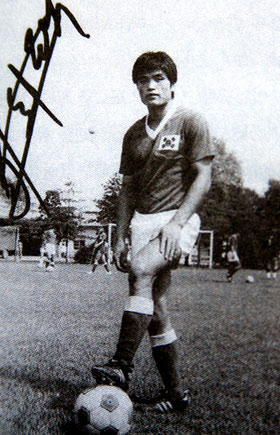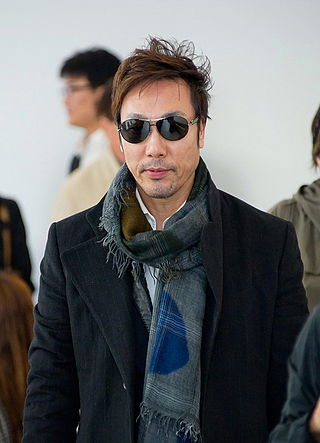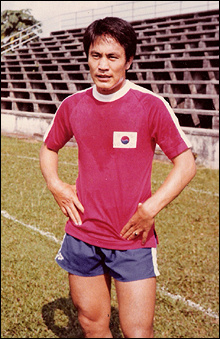Related Research Articles

Pak Mog-wol was an influential Korean poet and academic.

Lee Hoe-taik is a former South Korean football player and manager. He is widely regarded as one of the greatest South Korean forwards of all time. He is also one of four players inducted into the Korean FA Hall of Fame.
The South Korea national under-20 football team represents South Korea in international youth football competitions and also can be managed as under-18 or under-19 team if necessary. South Korean under-20 team won twelve AFC U-20 Asian Cup titles and reached the FIFA U-20 World Cup final once, both are the most successful results among Asian teams.

Cha Kyung-bok was a South Korean football manager.

This article shows unofficial matches of the South Korea national football team. They don't meet the standard of international "A" matches.

Legislative elections were held in South Korea on 27 February 1973 to elect 146 members of the National Assembly. Another 73 members appointed by President Park Chung-hee were indirectly elected by the National Conference for Unification on 7 March 1973.
The Kyungsung FC–Pyongyang FC rivalry, commonly known as the Kyung-Pyong Football Series, was a football rivalry in the early 20th century between Seoul and Pyongyang which are currently capital of South Korea and North Korea. The clash between Korea's two biggest cities was considered as the biggest rivalry in Korea. Seoul and Pyongyang developed historical rivalry for over a century, and their football teams were no exception.

Lee Moon-sae is a South Korean ballad singer who is often considered a Korean pop icon. Since his debut in 1978, he has released 16 full-length albums, including 1987's When Love Passes By, which sold 2.85 million copies, making it the best-selling album in South Korea to date at the time. He is also well known for being the host of the popular South Korean radio show, Starry Night, on MBC FM, from 1985 to 1996. He was diagnosed with thyroid cancer in 2007.
Bang Hyun-joo is a South Korean sport shooter who competed in the 1988 Summer Olympics and in the 1992 Summer Olympics.
Park Seong-tae is a South Korean former sports shooter. He competed in the skeet event at the 1972 Summer Olympics.

Choi Yun-hui is a South Korean swimmer who served as the 2nd Vice Minister of Culture, Sports and Tourism under President Moon Jae-in from 2019 to 2020. She is the first woman and second professional sports player to become deputy head of the Ministry or of its preceding agencies. She competed in two events at the 1984 Summer Olympics.
Mo Myeong-hui is a South Korean sprinter. She competed in the women's 200 metres at the 1984 Summer Olympics.
Seong Nak-gun is a South Korean sprinter. He competed in the men's 4 × 100 metres relay at the 1988 Summer Olympics.
Go Se-tae was a South Korean basketball player who competed in the 1956 Summer Olympics. He graduated from Kaesong Songdo Middle School, and went on to attend Korea University. In 1952 he was in military service and played for the Military Manpower Administration basketball team. He later played for the Korea Development Bank team. After his appearance at the Olympics, he became a director of the Korea Basketball Association, and was one of the few directors who did not join the mass resignation after the South Korean team's poor performance at the 1964 Summer Olympics. He died at his home in Hyochang-dong, Yongsan District, Seoul on the morning of 22 April 1986.
Kim Song-hui is a male North Korean former international table tennis player.
Young S. Cho, also known as Jo Yeong-seok, is a South Korean alpine skier. He competed in two events at the 1964 Winter Olympics.

Kim Hong-il was a Korean independence activist and a general of the Second Sino-Japanese War and the Korean War, who later became a diplomat and politician in South Korea. Born in North Pyongan, he did his early schooling in China and Korea, and had a brief career as a teacher before his connections with the nascent Korean independence movement led to his imprisonment. He fled into exile in China in 1918, and served in the Kuomintang's National Revolutionary Army from 1926 to 1948, following which he moved to the newly independent South Korea to join the Republic of Korea Army. He commanded South Korea's I Corps during the first year of the Korean War, and was then sent to Taipei as South Korea's ambassador to the Republic of China, which by then had retreated to Taiwan. His assignment there ultimately lasted nine years. He returned to South Korea in 1960 following the April Revolution which ended the rule of Syngman Rhee, and served briefly as Minister of Foreign Affairs under the Park Chung-hee junta. He ran for the National Assembly, first unsuccessfully in 1960 and 1963, and was then elected in 1967 and became a major figure in the opposition New Democratic Party.
Kim Yeong-gi is a South Korean basketball player. He competed in the men's tournament at the 1956 Summer Olympics and the 1964 Summer Olympics.
Nam Sang-lan is a South Korean rowing coxswain. She competed in the women's coxed four event at the 1988 Summer Olympics.

Hwang Jae-man was a South Korean former football player and manager, playing as a left-back and midfielder. He is known as a long throw-in during his playing days, and has scored on several occasions with mid-range shots based on powerful kicks. He also displayed solid defensive skills with strong man-to-man marks, and from his twilight years onwards, he captained the club and South Korea, demonstrating leadership.
References
- ↑ "Sim Myeong-hui". Sports Reference. Archived from the original on 17 April 2020. Retrieved 11 July 2015.
- ↑ "五輪選手選定「레스링」과射擊" [Decision on Olympics competitors for wrestling and shooting]. Kyunghyang Shinmun . 24 September 1956. p. 3. Retrieved 22 January 2018– via Naver News.
- ↑ Doyle, Edward A. (ed.). "Shooting". The Official Report of the Organizing Committee for the Games of the XVI Olympiad, Melbourne, 1956 (PDF). Organizing Committee of the XVI Olympiad. p. 558. OCLC 224257408.
- ↑ "財務部가一位 職場對抗射擊大會" [Ministry of Finance in first place in Workplace Defense Shooting Championships]. The Dong-A Ilbo . 7 September 1959. p. 3. Retrieved 22 January 2018– via Naver News.
- ↑ "寒心한慘敗의記錄" [Record of a sorrowful and tragic defeat]. Kyunghyang Shinmun. 12 September 1960. p. 4. Retrieved 22 January 2018– via Naver News.
- ↑ "射擊協會를分離 라이플과트랩" [Korean Shooting Association splits by rifle and trap]. The Dong-A Ilbo. 20 January 1965. p. 4. Retrieved 22 January 2018– via Naver News.
- ↑ "사격선수沈明熙씨 즉석에서일품料理" [Sports shooter Mr. Sim Myeong-hui's on-the-spot top-class cuisine]. Maeil Business Newspaper . 3 October 1967. p. 3. Retrieved 22 January 2018– via Naver News.
- ↑ "會長에金魯洙씨" [Mr. Kim No-su to be president of newly-founded Central Fishing Association 中央(중앙)낚시회創總]. Maeil Business Newspaper. 6 June 1967. p. 6. Retrieved 22 January 2018– via Naver News.